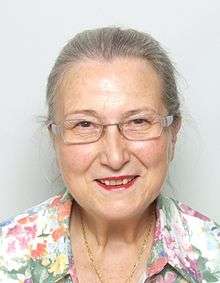Zina Weygand
Zina Weygand (born April 23 1945) is a French historian and emeritus researcher at the Conservatoire national des arts et métiers[1]. She obtained her PhD from University Paris 1 in 1998.
Zina Weygand | |
|---|---|
 | |
| Born | 04/23/1945 |
| Nationality | French |
Weygand is a specialist of disability history, especially the history of blind people in France from the Middle Ages to the beginning of the XXth century. She is part of the Annales School, and her scholarship focuses on the history of individual and collective representations of blindness, organisations supporting blind people, and the pedagogical techniques developed for blind pupils during the XVIIIth and XIXth century.
She was born in Paris.
Research themes
Weygand has extensively published about the history of education for blind people. In her history of blind people in France[2], she examines the evolution of collective perceptions of blind people, from duplicitous beggars or powerless people needing Christian charity in the Middle Ages, to educable subjects in the late XVIIIth century [3]. She argues the interest of Enlightenment philosophers for the mechanisms of perception (especially John Locke and Denis Diderot) has driven the support of French philanthropists, enabling Valentin Haüy to open the first school for the blind.
Weygand has also published long-forgotten memoirs and archives, such as the memoir of Thérèse-Adèle Husson, enabling scholars to better understand experiences of blind people of the past.
Publications
- The Blind in French Society from the Middle Ages to the Century of Louis Braille, Stanford University Press, 2009
- Les causes de la cécité et les soins oculaires en France au début du XIXe siècle (1800-1815), Paris, CTNERHI, diffusion PUF, 1989, 332 p11.
- Jacques Lusseyran, entre cécité et lumière, Marion CHOTTIN, Céline ROUSSEL, Zina WEYGAND (dir.), Paris, Éditions Rue d'Ulm, Presses de l'École normale supérieure, 2019, 232p12
Recognition
- 2014: knight of the French Legion of Honour[4],[5]
Notes and references
Content in this edit is partially translated from the existing French Wikipedia article at Zina Weygand; see its history for attribution.
- "WEYGAND Zina | Conservatoire National des Arts et Métiers - Academia.edu". cnam.academia.edu. Retrieved 2019-07-27.
- Press, Stanford University. "The Blind in French Society from the Middle Ages to the Century of Louis Braille | Zina Weygand Translated by Emily-Jane Cohen, with a Preface by Alain Corbin". www.sup.org. Retrieved 2019-07-27.
- Brulé, Emeline. "The Blind in French Society from the Middle Ages to the Century of Louis Braille, by Zina Weygand". Design and Society (in French). Retrieved 2019-07-27.
- Décret du 31 décembre 2013 portant promotion et nomination, retrieved 2019-07-27
- Thompson, Hannah (2014-05-08). "Blind Spot: Zina Weygand receives the Legion of Honour". Blind Spot. Retrieved 2019-07-27.